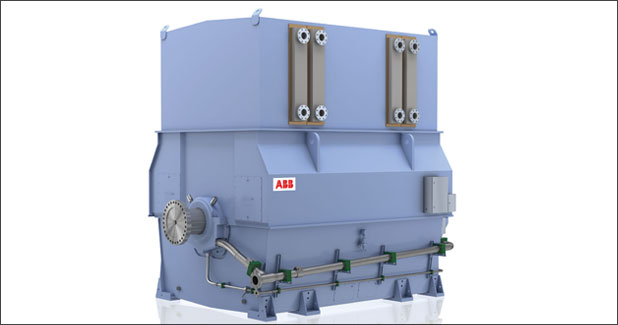
ABB motor reaches almost 100 per cent energy efficiency
Tests carried out on a 44-MW 6-pole synchronous ABB motor shortly before delivery showed an efficiency 0.25 per cent greater than the 98.8 per cent stipulated in the contract, resulting in the world record for electric motor efficiency. This efficiency improvement could save approximately $500,000 in electrical energy costs over the course of a 20-year lifetime for each motor.
?With electricity costs being, by far, the largest component in the total cost of ownership of such a motor, savings like these have a significant impact on profits,? said Sami Atiya, President of ABB?s Robotic and Motion division. ?In addition to extremely high efficiency, synchronous motors are renowned for their proven quality and reliability. Their robust design ensures reliability through cool operation temperatures and low vibration. As a pioneering technology leader driving the energy revolution, and as part of our Next Level strategy, we are strongly committed to developing technology that improves efficiency and productivity.?
The world record efficiency was reached by optimising the motor?s electrical and mechanical features, based on ABB?s application knowledge and more than 100 years of experience in manufacturing electric motors. The average efficiency for this type of synchronous motor is between 98.2 and 98.8 per cent. If the motor is in continuous operation, the 0.25 per cent efficiency improvement saves 1,000 MWh energy per year which is equivalent to annual electricity consumption of 240 European households.
The synchronous motor is a special type of alternating current (AC) motor, being some 5 x 4 x 4 m in size for an output power of 44 MW. Typical uses of synchronous motors are for driving fans, pumps, rolling mills, mine hoists, and compressors in industries such as air separation, oil and gas, chemical, marine, metals, mining, water, and pulp and paper.
?With electricity costs being, by far, the largest component in the total cost of ownership of such a motor, savings like these have a significant impact on profits,? said Sami Atiya, President of ABB?s Robotic and Motion division. ?In addition to extremely high efficiency, synchronous motors are renowned for their proven quality and reliability. Their robust design ensures reliability through cool operation temperatures and low vibration. As a pioneering technology leader driving the energy revolution, and as part of our Next Level strategy, we are strongly committed to developing technology that improves efficiency and productivity.?
The world record efficiency was reached by optimising the motor?s electrical and mechanical features, based on ABB?s application knowledge and more than 100 years of experience in manufacturing electric motors. The average efficiency for this type of synchronous motor is between 98.2 and 98.8 per cent. If the motor is in continuous operation, the 0.25 per cent efficiency improvement saves 1,000 MWh energy per year which is equivalent to annual electricity consumption of 240 European households.
The synchronous motor is a special type of alternating current (AC) motor, being some 5 x 4 x 4 m in size for an output power of 44 MW. Typical uses of synchronous motors are for driving fans, pumps, rolling mills, mine hoists, and compressors in industries such as air separation, oil and gas, chemical, marine, metals, mining, water, and pulp and paper.


 +91-22-24193000
+91-22-24193000 Subscriber@ASAPPinfoGlobal.com
Subscriber@ASAPPinfoGlobal.com